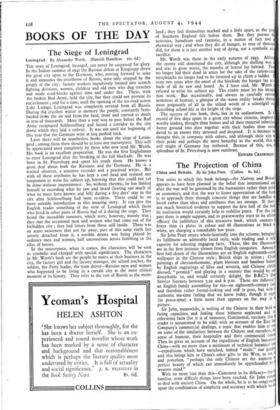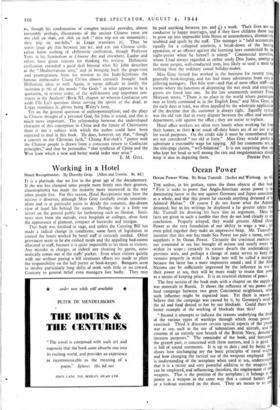The Projection of China
China and Britain. By Sir John Pratt. (Collins. 8s. 6d.)
THE series to which this book belongs—the Nations and Brit appears to have been planned in the belief that international after the war will be governed by the humanities rather than po or economics, and that the way to foster appreciation of the fo is to approach them through concrete things that are familiar loved rather than ideas and attributes that are strange. If there not much historical evidence to support the first half of the its realisation would certainly help to stabilise peace. For the part there is ample support, and in praiseworthy trust in its ult efficacy the publishers of this attractive book, which contains fewer than 1 x plates in colour and 68 illustrations in black white, are charging a remarkably low price.
Sir John Pratt enters whole-heartedly into the scheme, bringing its fulfilment an admirably lucid style, wide reading and a te capacity for selecting engaging facts. These, like the illustrau are in the first instance chosen from English categories. Among first half-dozen of the illustrations are an English eighteenth-cen wallpaper in the Chinese style ; British ships in action ; Ch. paintings of chrysanthemums, plum blossom and bamboo ba by English engravings of lilies and wistaria, and Chinese chit dressed, " permed " and playing in a manner that would be describable to, and would certainly delight, the B.B.C.'s H Service listeners between 5.20 and 6 p.m. These are followed an English family assembling for tea—an eighteenth-century f and therefore rather formal-looking and stiff in pose, but with authentic tea-time feeling that we know today, though it ex (in peace-time) a little more than appears on the tray in picture.
Sir John, meanwhile, is writing of the Chinese in their bold faring capacities, and linking these hitherto neglected and refreshing facts (for it is of immense, Continental, territory that reader is accustomed to be told) with an account of the East I Company's commercial dealings, a topic that enables him to t on some of the similarities between the Chinese and ourselves, sense of humour, their hospitality and their commercial hon Then he gives an account of the expeditions of English botanists China—with no more than a minimum of technical botanical te —expeditions which have enriched, indeed " made," our gar and this brings him to China's other gifts to the West, to tea, and porcelain, " perhaps the only Chinese art the supreme perfect beauty of which can immediately be apprehended by western mind."
With no more hint than this—Cantonese in its delicacy—that familiar, even difficult things have been reached, Sir John pr to deal with ancient China. On the whole, he is to be conga upon the combination of simplicity and accuracy with which so, though his condensation of complex material provides, almost inevitably perhaps, illustrations of the ancient Chinese verse jen mo chih yii sham, erh chih yii tieh (" men trip not on mountains ; they trip on ant-hills," as Legge translates it). Thus he states (page 46) that between 200 B.C. and A.D. zoo Chinese civili- sation knew nothing of Hellenistic civilisation, though Professor Yetts in his Symbolism in Chinese Art and elsewhere, Laufer and others have given reasons for thinking the reverse. Hellenistic civilisation extended a good deal beyond what Sir John describes as the " Mediterranean area," and in bringing back the grape-vine and promegranate from his mission to the Indo-Scythians the famous ambassador Chang Ch'ien almost certainly brought back Hellenistic ideas as well. Again, it seems difficult to justify the insertion p. 76) of the words " the Gods " in what appears to be a quotation, in reverse order, of the well-known and important sen- tences in the Analects' (Book XI, chapter xi) wherein Confucius sets aside Chi Lu's question about serving the spirits of the dead, as Legge translates it, ghosts being Waley's term.
Yet on the general question of anthropomorphism, and the place in Chinese thought of a personal God, Sir John is sound, and that is much more important. The relationship between the undeveloped character of this conception in China and the future of Christianity there is not a subject with which the author could have been expected to deal in this book. He does, however, say that, " though a convert to the Christian faith," Chiang Kai-shek's "power with the Chinese people is drawn from a conscious return to Confucian principles," and that he personifies " that synthesis of China and the West from which a new and better world order may arise."
E. M. Guu...



























 Previous page
Previous page